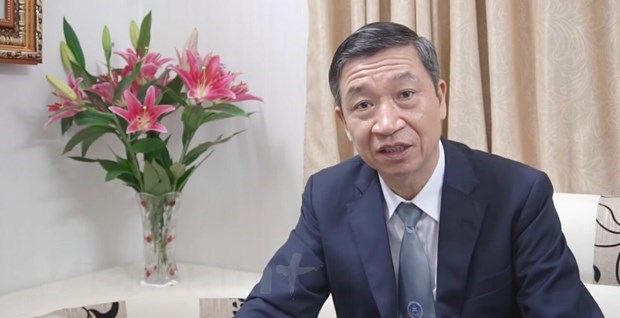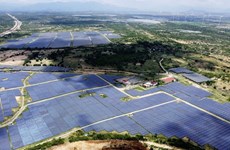Code of conduct a “soft institution” to ensure healthy digital environment
 Social media use in adolescence is associated with tiredness and depression, and false awareness and behaviours among students. (Photo: VietnamPlus)
Social media use in adolescence is associated with tiredness and depression, and false awareness and behaviours among students. (Photo: VietnamPlus)Hanoi (VNA) – The code of conduct on social networks, recently introduced by the Ministry of Information and Communications, is expected to help build a healthy internet environment, a lawyer has said.
In an interview granted to VietnamPlus, Le Ngoc Khanh, from the Hanoi Bar Association, pointed to both positive and negative effects of social networks, especially on children.
Many parents have allowed their children to go on TikTok , Facebook and YouTube that have numerous harmful video clips without setting any restrictions, he said, citing the recent violations by YouTubers Tho Nguyen and Timmy TV.
More and more children are using social networks, but there have been no barriers to protect them from the harmful contents yet, according to the lawyer.
Social media use in adolescence is associated with tiredness and depression, and false awareness and behaviours among students, Khanh continued.
Regarding the right to freedom of speech, he said it must be restricted to protect the secrets of the State, businesses and individuals, as well as respect honour and dignity of citizens.
Any violations of legal rights and interests of organisations and individuals, or interests of the State will be subject to administrative penalty and face criminal proceedings, he said.
The code of conduct, which targets organisations and individuals using social networks and social network service providers in Vietnam, is designed to ensure civil liberty, freedom to run business, and has no discrimination between domestic and foreign service providers, in line with international standards, international practice and treaties to which Vietnam is a signatory.
It looks to develop ethical standards for behaviours on social networks, educate and develop good habits for social network users, contributing to building a healthy and safe online environment.
The code encourages organisations and individuals to share information from official and reliable sources, and behave in ways that match traditional moral and cultural values of Vietnam.
The document also requires organisations and individuals not to use words that incite hatred or trigger violence and gender and religious discrimination, publish contents violating legal regulations and information defaming others, spread fake news and untrue information, and conduct illegal advertising, affecting social order and safety.
Organisations and individuals should use real names when registering for the use of social networks, and register with the service providers to certify their names, website addresses and contacts.
The code encourages social network users to optimise the networks to promote the land, people and culture of Vietnam, and educate and protect children and teenagers in the online world.
Organisations and individuals using social networks, and service providers are encouraged to fully observe the code of conduct and popularise it to other users.
The document came into force as from June 17.
 Le Ngoc Khanh, from the Hanoi Bar Association (Photo courtesy of Le Ngoc Khanh)
Le Ngoc Khanh, from the Hanoi Bar Association (Photo courtesy of Le Ngoc Khanh)Khanh said the code aims to build a healthy internet environment, and ensure the right to freedom of individuals and businesses, in line with international practice and treaties to which Vietnam is a signatory.
Although it is not a biding document, the code of conduct provides standards of behaviour and creates a framework for social criticism against social bad deeds, he said.
For children, it serves as a filter, helping to control information on social networks, according to Khanh.
Thanks to the code of conduct, harmful contents will be detected and removed early, he said, noting that children will also be equipped with necessary skills to protect themselves and recognise risks on social networks.
It is seen as a “soft institution” helping to build a healthy internet environment, he emphasised.
Khanh also stressed the need to supplement more stringent and specific regulations, matching the country’s socio-economic situation, thus contributing to stamping out violations in the digital environment. /.













